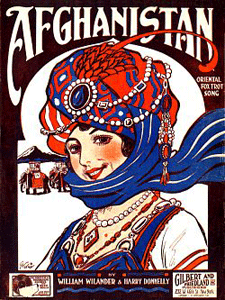
America not only flexes its military muscles and economic clout around the world, but at times takes the rest of the world for a song and dance. Vaudeville, the early 20th century dance hall and stage phenomenon, lyrically used and abused the world as a stage. But it seldom looked much like the real world of the time, and certainly not after almost a century later. Here was popular Orientalism, in the Valentino Sheik mode, for anyone who could afford sheet music. One of the wonderful nostalgic websites documenting this era is Parlor Songs, which publishes an online magazine.
If you would like to see how Vaudeville treated the Orient, check out the article by Richard A. Reublin in the 2005 issue. Among the songs discussed is “Afghanistan” written in 1920 by William Wilander and Harry Donnelly. Click here to listen to the song as you read the lyrics:
Afghanistan
A Romance of Asia
Words and Music by
William Wilander & Harry Donnelly
Published 1920 by Gilbert & Friedland, Inc.[Verse 1]
In the land of Afghanistan,
There’s a Hindu maid and a man,
She swore by the stars up above her,
That he was the one to love her.But there came another one day,
Stole his Hindu maiden away.
Hindu man is lonely and blue,
In his dreams he’s calling to her.[Chorus]
In Afghanistan, There’s a caravan,
By the fair oasis waiting for you, and for you only;
Cross the desert sand, we will find a temple;
There will be a bridal day for you my idol,
In Afghanistan.[Verse 2]
All the wealth of Afghanistan,
Cannot ease the heart of this man,
Tho’ the stars with splendor are shining,
Hindu’s heart can’t stop it’s pining.Though he’s trying hard to forget,
He has hopes and dreams of her yet.
Thinking that she’ll come back some day,
To his idol he keeps praying.[Chorus]
Here is what Reublin says about this song in relation to real Afghan music:
The entire area we tend to call the Middle-East is actually geographically considered western Asia and as such, we do hear similarities to some eastern Asian music. Afghanistan finds itself in an area where their music is influenced more by Asia and India as opposed to the Arab states. Of course we know Afghanistan more for the Taliban and the recent war that ousted them in favor of democracy. Afghan instrumentation is similar to Arabic but has a vast variety of lute-like instruments including several that are completely unique to Afghanistan, the rubab, tanbur and the dambura.
Their music has an extremely melodic and interesting sound. On the one hand, the Indian influence is clear and on the other, it has some sounds that are quite unique. You must go to http://www.afghanistan.org/music.asp?al and listen to some of the fabulous music they have available to listen to, it’s another “don’t miss” site.
As for the song we’ve featured, it of course has no similarity to true Afghan music but like the others this month, it is very much a Tin Pan Alley product. The song uses a common musical motif in the bass line that seems to have somehow become one that conveys a desert-mid-east sound, a 4/4 dum-dum, dumdum, dum dum alternating of an octave and a single note. As well, the verse really conveys that “mysterious” somewhat foreign melody that we might associate with far away oriental places. The cover calls the work a “oriental fox-trot song.” It really is a fascinating and well crafted song. I hope you enjoy it.
The Afghanistan sung in Tin Pan Alley a bit off key, forlorn Hindu lovers and elephant caravans to the fore.